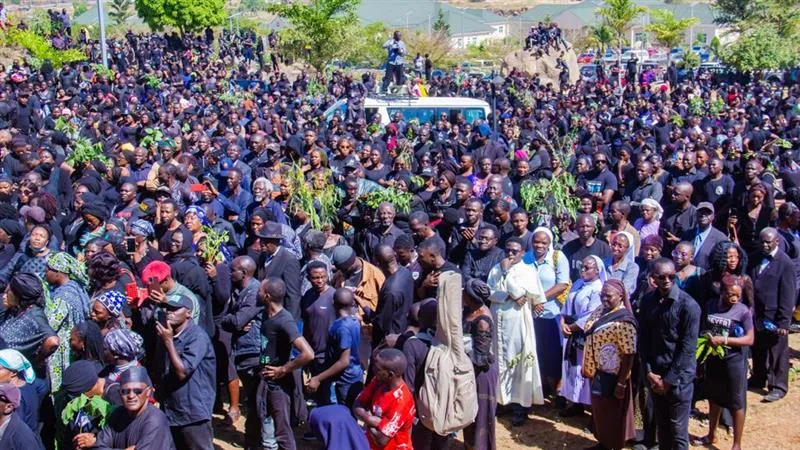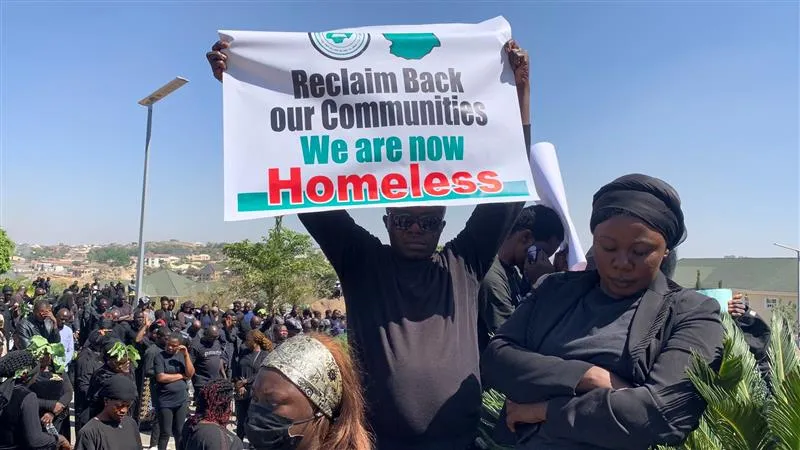
56,000 killed in Nigeria’s ethnic and religious violence; Christians disproportionately affected
 This image grab made from an AFPTV video taken in Maiyanga village, in Bokkos local government, on December 27, 2023 shows families burying in a mass grave their relatives killed in deadly attacks conducted by armed groups in Nigeria’s central Plateau State. / Credit: Photo by KIM MASARA/AFPTV/AFP via Getty Images
This image grab made from an AFPTV video taken in Maiyanga village, in Bokkos local government, on December 27, 2023 shows families burying in a mass grave their relatives killed in deadly attacks conducted by armed groups in Nigeria’s central Plateau State. / Credit: Photo by KIM MASARA/AFPTV/AFP via Getty Images
Washington, D.C. Newsroom, Sep 3, 2024 / 18:05 pm (CNA).
A new report has found that ethnic and religious violence in Nigeria has claimed the lives of nearly 56,000 people in the West African country over four years — and the victims were disproportionately Christian.
The report, published by The Observatory for Religious Freedom in Africa, found more than 11,000 incidents of extreme violence from October 2019 through September of 2023. The violence left 55,910 people dead in 9,970 deadly attacks — as well as 21,621 people abducted in 2,705 attacks.
The total number includes civilian deaths, terror group deaths, and Nigerian Armed Forces deaths. Of the total deaths, 30,880 were civilians.
Of the civilians, at least 16,769 Christians were killed, 6,235 Muslims were killed and 154 adherents of traditional African religions were killed. The religions of 7,722 victims are unknown.
The proportional loss for Christians, however, was much higher in the states where the attacks occurred. In terms of state populations, the report found that Christians were 6.5 times more likely to be killed in the violence. Similarly, when accounting for state populations, Christians were 5.1 times more likely to be victims of abduction.
“Millions of people are left undefended,” Frans Vierhout, a senior analyst at The Observatory of Religious Freedom in Africa, said in a statement.
“For years, we’ve heard of calls for help being ignored, as terrorists attack vulnerable communities,” he added. “Now the data tells its own story.”
According to the report, 81% of civilian killings were land-based community attacks. About 42% of those killings were carried out by armed Fulani herdsmen, which the researchers said invaded small Christian farming settlements to kill, rape, abduct and burn homes.
Fulani herdsmen, who are Sunni Muslim, killed at least 9,153 Christian civilians and at least 1,473 Muslim civilians in community attacks, according to the data. The religion of at least 1,267 victims of Fulani herdsmen attacks is unknown.
About 41% of the land-based community attacks came from a variety of groups, which the report categorizes as “other terrorist groups.” However, the report states that the “other” category likely “consists of different groups of ‘Fulani bandits’ who are as much part of the Fulani Ethnic Militia… as the Armed Fulani Herdsmen.”
The “other” terrorist groups are responsible for 10,274 killings in land-based community attacks, which include at least 3,804 Christians and 2,919 Muslims. The religion of about 3,503 victims is unknown.
At least 78 people killed by Fulani herdsmen and “other terrorist group” attacks adhered to traditional African religions.
“Fulani Ethnic Militia are targeting Christian populations, while Muslims also suffer severely at their hands,” the Rev. Gideon Para-Mallam, another analyst for The Observatory of Religious Freedom in Africa, said in a statement.
“Kidnappers work to Islamist goals,” he added. “Where young women are kidnapped, tortured, and sexually violated, hope for normal married life, and family, may vanish.”
Islamist groups Boko Haram and the Islamic State West Africa Province carried out about 11% of the community attacks. Boko Haram killed at least 851 Christian civilians and 491 Muslims in such attacks, while the religions of 609 victims are unknown. The Islamic State killed at least 265 Christians and 127 Muslims, while the religion of 296 victims areunknown.
Nina Shea, the director of the Hudson Institute’s Center for Religious Freedom, told CNA that “the numbers killed and abducted are staggering and the documentation is now irrefutable.”
“Fulani militants are waging a religious war, a jihad, against undefended Christian farming communities in large swaths of Nigeria,” she argued. “Equally undeniable and shocking is the fact that the Nigerian government has idly watched and tolerated these relentless attacks over many years. The goal of the militants to eradicate the Christian presence by murder, forcible conversion to Islam, and driving them out of their homeland appears to be shared by the government in Abuja [the capital of Nigeria] or else it would take action.”
Shea criticized the United States Department of State (DOS) for its repeated refusal to designate Nigeria as a “Country of Particular Concern,” a watchlist of countries responsible for severe violations of religious freedom.
Nigeria was first included on the list in 2020, the final year of former President Donald Trump’s administration. However, it was removed in 2021, during the first year of President Joe Biden’s administration. The DOS report blamed the Nigerian violence on “intercommunal clashes” and a competition for resources.








